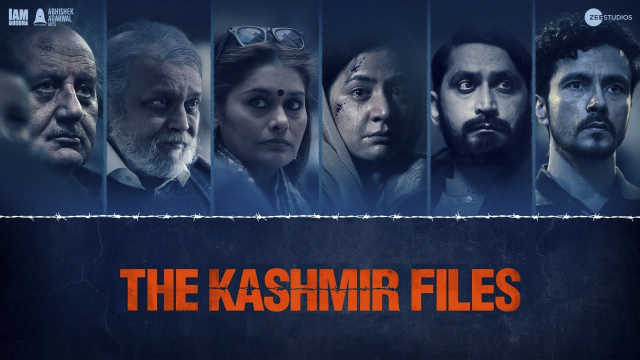The genocide of Kashmiri Pandits is one of the darkest chapters in Indian history. Yet, not much has been spoken about it over the decades. We have had only two Hindi films made on the issue before this week – Ashoke Pandit’s Sheen (2004) and Vidhu Vinod Chopra’s Shikara (2020). We now have the third one in the form of filmmaker Vivek Rankan Agnihotri’s The Kashmir Files.
How exactly the film plays out will be discussed later. But broadly speaking, it succeeds in its basic aim of making you feel for the incident and the Pandits.
The Kashmir Files narrates two parallel stories. One is based in 1990 when terrorists headlined by Farooq Abdul Bitta (Chinmay Mandlekar) create havoc in the lives of Kashmiri Pandits. They are given an option to convert to Islam, run for their lives or die. One such family is that of Pushkar Nath Pandit (Anupam Kher), his son, daughter-in-law (Bhasha Sumbli) and two grandsons.
The other track is based in today’s times and it revolves around Krishna Pandit (Darshan Kumaar), the grandson of Pushkar. He studies in ANU in Delhi and is a part of a radical group of students who don’t believe the enormity of the Kashmiri Pandit genocide and demand a separate Kashmir. The group is captained by their professor Radhika Menon (Pallavi Joshi).
Pushkar returns to Kashmir after his grandfather’s death to distribute his remains. Once there, he gets to know the seriousness of the Kashmiri Pandit issue and his views about the whole affair go through a change.
The Kashmir Files leaves no stone unturned when it comes to showing the gruesomeness of the whole incident. We see disturbing visuals of people being shot point blank, cut vertically through a wood-cutting machine, a woman forced to consume rice mixed with her murdered husband’s blood, etc. These visuals, obviously, are disturbing but a majority of times they work for bringing to light the horrific crimes against innocents.
Splitting the narrative into two time zones is a smart idea. One does feel a bit confused on few occasions but things fall into place, especially by the time the film ends.
The camerawork and colour grading suit the subject perfectly. This subject doesn’t deserve vibrant visuals of the valley, as is seen from various happy Hindi film songs shot here in the past.
This is the meatiest role Darshan Kumaar has ever got to play and he grabs the opportunity with both hands. He shines the most during his monologue. Chinmay Mandlekar is the best of all, not just when it comes to expressions and body language but also the diction. It’s difficult to believe that just last month we saw the same person play Shivaji Maharaj in the Marathi movie Pawankhind.
Pallavi Joshi is excellent as the radical professor. It is a surprise why we don’t see her more often. Mithun Chakraborty, as the helpless IAS officer, succeeds in moving you. Atul Srivastav and Puneet Issar chip in with good support. Bhasha Sumbli is the surprise element.
However, Anupam Kher doesn’t live up to the expectations as he goes in the over-the-top zone on quite a few occasions. This comes as a rude surprise.
The Kashmir Files would have been much more impactful but for few issues. The runtime of 170 minutes is very high. There are a number of periods where the pace slows down and the narrative almost becomes like a docu-drama. The film needed to be much crisper. Although Darshan Kumaar acts well, the way his character keeps changing sides is not convincing and too convenient.
But what hurts the film the most is the more than in-your-face propaganda when it comes to the portrayal of JNU [the censors made them change it to ANU]. The university is vilified as a hub whose only aim is to harm the nation, especially through the character of Pallavi Joshi.
Also read: Gangubai Kathiawadi review
At one point, this aspect becomes so strong that it somewhat reduces the impact created about the sorry tale of Kashmiri Pandits. In other words, this eagerness to paint the entire institute in a particular way affects the very issue the film eagerly wants to raise, although for some time.
Overall: The Kashmir Files creates an impact despite the hiccups. The film is expected to gain surprisingly positive box office collections because of the high amount of buzz. Plus, the film’s budget is only Rs 14 crore.
Rating: 3 out of 5
Director: Vivek Ranjan Agnihotri
Writer: Vivek Ranjan Agnihotri
Producers: Tej Narayan Agarwal, Abhishek Agarwal, Pallavi Joshi and Vivek Ranjan Agnihotri
Runtime: 170 minutes

